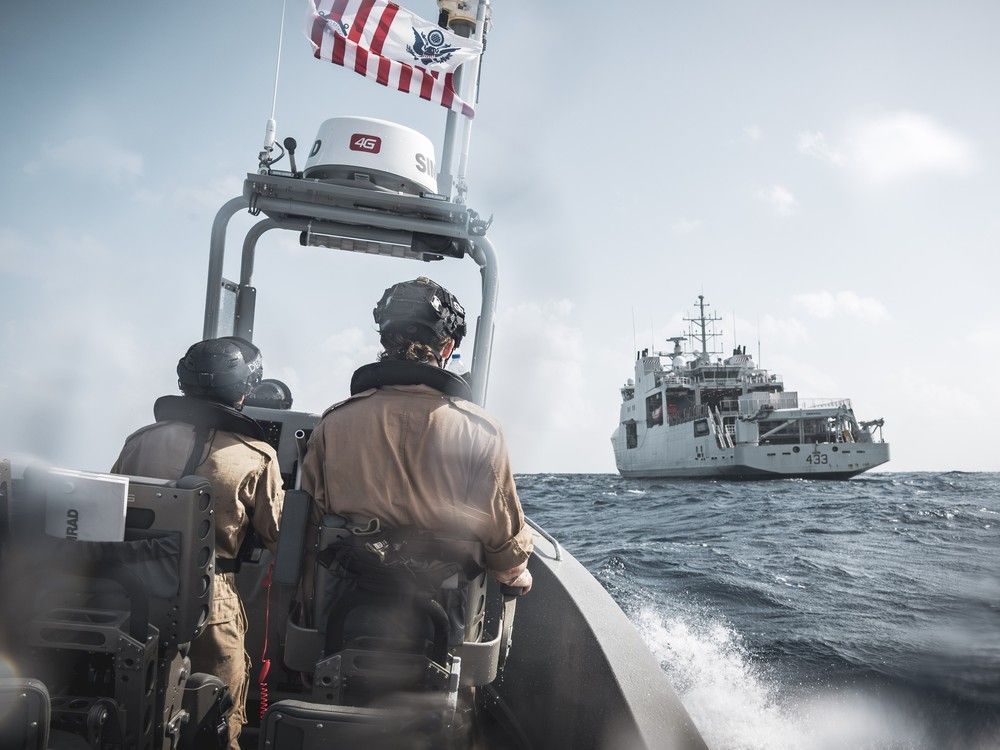
The Canadian Forces will continue to take part in U.S. counter-drug operations in the Caribbean but won’t provide support or equipment for President Donald Trump’s self-declared war on drug cartels.
U.S. military forces have destroyed four, possibly five, alleged drug smuggling vessels, killing all the individuals on board.
Critics say the attacks violate international law. But the Trump administration has justified the strikes by claiming that members of drug cartels are unlawful combatants and the U.S. is now in an “armed conflict” with them.
The Canadian military is a major player in U.S.-led counter drug operations in the Caribbean with Royal Canadian Navy ships and Royal Canadian Air Force long range patrol planes playing a role. But those missions are part of Operation CARIBBE , a multi-national force that is led by the U.S. Coast Guard.
“The Canadian Armed Forces does not participate in any U.S.-led counter-narcotic operations outside of Operation CARIBBE,” confirmed Department of National Defence spokesperson Cheryl Forrest. “At this time, there are no planned changes to our current Operation CARIBBE engagements.”
She noted that Canadian Armed Forces activities under Operation CARIBBE “are separate and distinct” from the U.S. military strikes alleged against drug cartel boats.
Operation CARIBBE has been running since November 2006. Royal Canadian Navy warships find and track vessels of interest at which point U.S. Coast Guard law enforcement teams then approach and intercept them, according to the Canadian government. RCAF CP-140 Aurora aircraft and their crews are also detect and track vessels and aircraft of interest.
The area being monitored covers the Caribbean Sea, the Gulf of Mexico and the eastern Pacific Ocean. Canada also allows U.S. Coast Guard teams to operate from Canadian warships.
Over the past seventeen years, the Canadian military has contributed to the disruption or seizure of more than 123 metric tonnes of cocaine, according to DND.
The U.S. attacks on small vessels, which started Sept. 3, has taken place in the Caribbean Sea, near Venezuelan waters.
The U.S. military has not released information on the precise locations of the attacks and neither the Pentagon nor Trump administration officials have provided evidence linking the boats to drug cartels.
The U.S. military buildup in the region is increasing tensions as Trump has linked Venezuelan President Nicolas Maduro to the cartels. Maduro has denied those allegations and has warned that the U.S. is looking for an excuse to remove him from power.
American news outlets have reported that the U.S. is now looking at striking at drug traffickers inside Venezuela.
Republican Senator Rand Paul has criticized the U.S. attacks in the Caribbean Sea. He pointed out that the new policy is killing people without due process or even a basic investigation into whether the ships were even headed for the U.S. “Maybe (the boat) was coming here. Maybe it wasn’t. But nobody’s even asking whether we need to prove that. We just blow them up,” he told reporters. “I got no love lost for these people. But at the same time, is this the new Coast Guard policy?”
But U.S. Vice President JD Vance posted on social media that killing cartel members who bring drugs into the U.S. “is the highest and best use of our military.”
David Pugliese is an award-winning journalist covering Canadian Forces and military issues in Canada. To support his work, including exclusive content for subscribers only, sign up here: ottawacitizen.com/subscribe